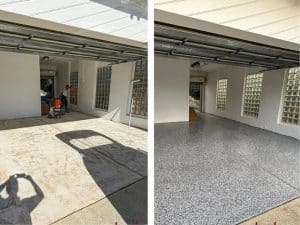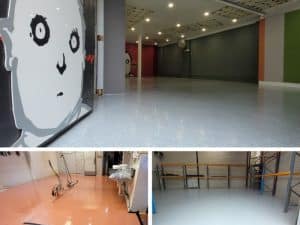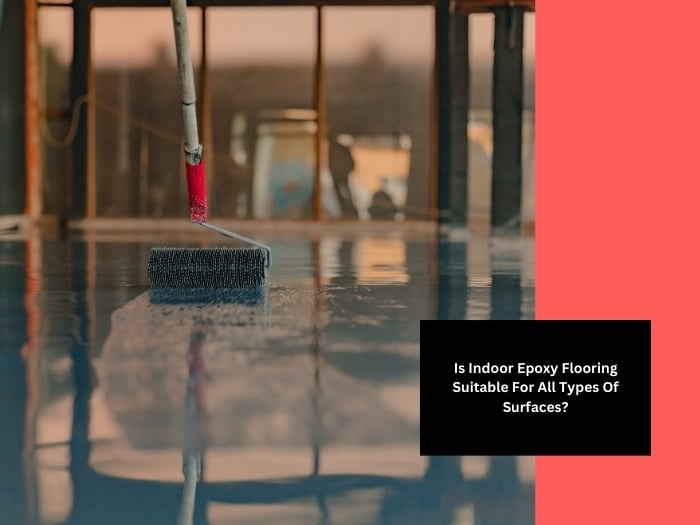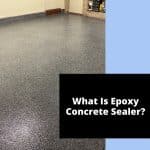Epoxy flooring has gained popularity in residential and commercial settings due to its resilience, aesthetic appeal, and ease of upkeep. However, the suitability of epoxy flooring can vary depending on the underlying surface. This guide will discuss the different types of surfaces compatible with indoor epoxy flooring and explore some factors to consider before deciding.
What makes indoor epoxy flooring versatile for different surface types?
Epoxy flooring is a versatile coating that can be applied to various surfaces. This versatility is due to its excellent adhesion properties and ability to withstand heavy foot traffic and chemical exposure.
Here are some of the critical factors that contribute to the versatility of epoxy flooring:
- Adhesion: Epoxy flooring forms a strong bond with most surfaces, including concrete, wood, metal, and even existing tiles. This ensures that the coating will not peel or crack over time.
- Durability: It is highly resistant to abrasion, impact, and stains. Furthermore, it can withstand heavy foot traffic and exposure to harsh chemicals, making it an ideal choice for high-traffic areas.
- Chemical resistance: Epoxy flooring is resistant to various chemicals, including acids, alkalis, and solvents. This makes it suitable for use in laboratories, factories, and other environments where chemical exposure is a concern.
- Moisture resistance: It is impervious to moisture, which helps to prevent mould and mildew growth. This is especially important in areas with high humidity levels.
- Slip resistance: It can be formulated as slip-resistant, essential for safety in areas with wet or greasy surfaces.
Can epoxy flooring be applied over existing concrete floors?
Yes, concrete floors can be effectively coated with epoxy. However, it is essential to prepare the surface properly before application. To prepare your concrete floor for epoxy flooring, ensure it is clean, degreased, and free of cracks or damage. Consider installing antistatic floor coatings, such as electronic equipment, for environments sensitive to electrostatic discharge.
- Improved appearance: Epoxy flooring can dramatically improve the appearance of an existing concrete floor. It can be customised with various colours and finishes to match your desired aesthetic.
- Increased durability: It can help to protect the concrete floor from damage and wear and tear.
- Reduced maintenance: Epoxy flooring is easy to clean and maintain. It is resistant to stains and spills and does not require waxing or polishing.
Is epoxy flooring suitable for residential spaces?
Yes, epoxy flooring is an excellent choice for residential spaces. It offers a combination of durability, aesthetics, and easy maintenance, making it a popular option for homeowners.
Here are some specific benefits of epoxy flooring for residential use:
- Customisation: Epoxy flooring can be customised with various colours, finishes, and textures to match any design style, from modern to traditional.
- Durability: It is resistant to scratches, stains, and spills, making it ideal for high-traffic areas like kitchens, bathrooms, and hallways.
- Low maintenance: Epoxy flooring is easy to clean and maintain, requiring minimal effort to keep it looking its best.
- Increased property value: Epoxy flooring can enhance your home’s overall appeal and value.
- Safety: It can be formulated with slip-resistant properties, making it safer for children and pets.

What surfaces are best for polished concrete floors?
Polished concrete floors are a type of flooring created by grinding and polishing the surface of concrete. They are highly durable, easy to clean, and can add a modern aesthetic to any space.
Here are some of the surfaces that are best suited for polished concrete floors:
- New concrete: New concrete is the ideal surface for polished concrete floors.
- Existing concrete: Existing concrete can be polished but may require more preparation to achieve the desired finish.
- Industrial floors: Polished concrete floors are commonly used in industrial environments due to their durability and ease of maintenance.
How does indoor epoxy flooring perform in commercial and industrial environments?
Epoxy flooring is renowned for its performance in commercial and industrial environments. It’s designed to withstand heavy foot traffic, machinery, and harsh chemicals, making it a preferred choice for various applications. Here’s why it’s so effective in these settings:
- Warehouses and factories: The flooring in warehouses and factories must endure constant wear and tear from heavy machinery and equipment. Epoxy flooring provides a durable surface that resists damage, reducing the need for frequent repairs.
- Workshops: Workshops often deal with spills, stains, and the use of harsh chemicals. Epoxy flooring’s chemical-resistant properties ensure the surface remains intact, even in challenging conditions.
- Food handling facilities: Hygiene is a top priority in food handling facilities. Epoxy flooring’s seamless finish prevents bacteria and germs from accumulating in cracks and crevices, making it easier to maintain a clean environment.
- Retail spaces: The appearance of the flooring in retail environments plays a significant role in the overall customer experience. Epoxy flooring offers a sleek, polished look that can be customised to match the brand’s aesthetic.
- Hospitals and laboratories: These environments require flooring that is both durable and easy to clean. Epoxy flooring meets these requirements while also providing resistance to chemicals and stains.

Are there customisation options for indoor epoxy flooring?
Yes, there are many customisation options available for indoor epoxy flooring. Here are some of the customisation options available for indoor epoxy flooring:
- Flake and colour options: Epoxy flooring can be customised with various flakes and colours, allowing you to create a unique design that complements your space. This is particularly popular in residential garages, commercial showrooms, and retail spaces.
- Metallic epoxy: For a more luxurious finish, metallic epoxy flooring can create a stunning, reflective surface that adds depth and dimension to the floor.
- Textured finishes: Textured epoxy finishes can enhance slip resistance, making them safer options for areas prone to moisture or spills, such as kitchens, bathrooms, and workshops.
- Logo and branding: In commercial and industrial settings, businesses can customize epoxy flooring with logos or branding elements to reinforce their identity.
Transform your space with Ultimate Epoxy Floors!
Suppose you want durable epoxy flooring for industrial applications. In that case, Ultimate Epoxy Floors is your go-to provider. With years of experience in the industry, we offer top-quality industrial epoxy flooring solutions tailored to meet your specific needs. Our team of experts will work with you to design and install a flooring system that is both functional and visually appealing. Learn more about Ultimate Epoxy Floors and request a free consultation.







